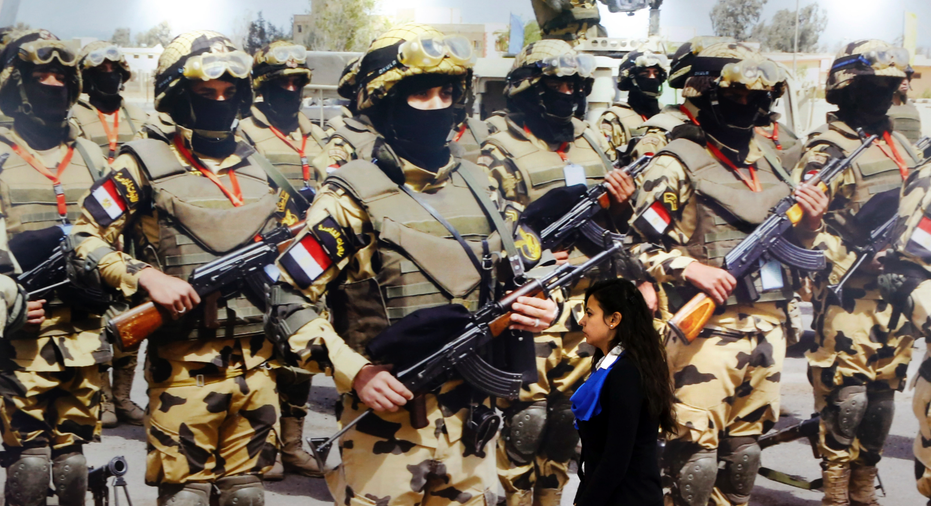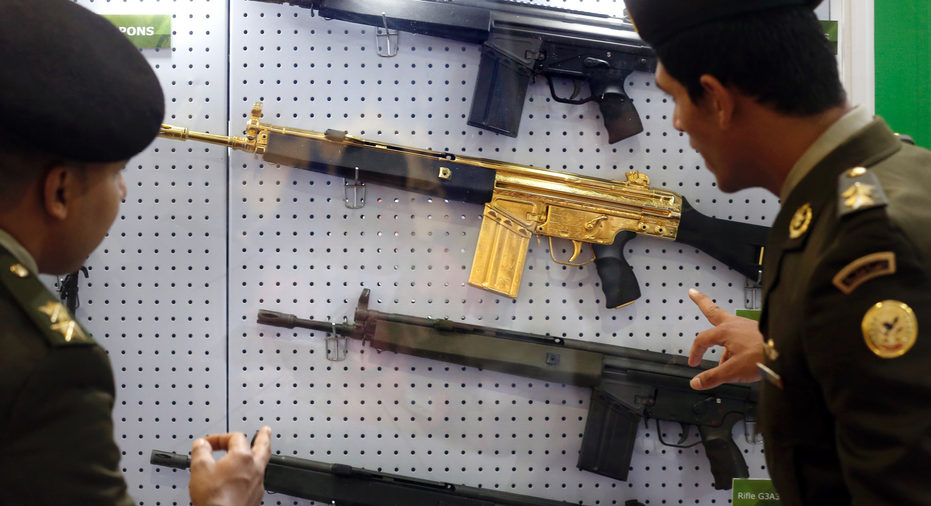With arms fair, big-buyer Egypt aims to diversify sources
A visitor walks past a banner displaying Egyptian commandos during the first arms fair organized in Cairo, Egypt, Monday, Dec. 3, 2018. Egypt's President Abdel-Fattah el-Sissi inaugurated the fair, where hundreds of companies are participating. (AP Photo/Amr Nabil)
CAIRO – Egypt's first international weapons fair wrapped up Wednesday, giving the major arms purchaser vast opportunities to diversify its weapons sources while hosting an event in the booming industry's hottest region, where conflicts rage from Libya to Yemen.
The three-day Egypt Defence Expo saw nearly 400 exhibition stands and some 10,000 military and defense visitors from over 40 countries. The fair was billed to the public as an event to boost the country's prestige on the world stage and project an image of security. It also sought to draw big-ticket buyers from oil-and-gas rich Gulf countries and set up an additional platform for an increasing number of global weapons traders.
Details on new agreements or sales resulting from the show have yet to be announced, and officials were tight-lipped about figures considered state secrets in Egypt, where the military has been a dominant force in politics since independence.
Egypt is fighting an Islamic State-led insurgency in the Sinai Peninsula and expends considerable military resources there.
The country has been the world's fourth largest arms importer in recent years, and officials say they seek to boost cooperation globally, obtain technologies to inject into local production, and even start to market some locally produced equipment.
"Egypt is no longer quite so reliant on the U.S. for military equipment and has been turning to other suppliers," said Ben Moores, a defense and aviation analyst for Jane's. "An event like this provides an opportunity for those newer suppliers to find contacts."
Egypt has a very rapidly growing backlog of un-awarded contracts and will likely import some $9 billion in weapons over the coming decade, he added. That makes it the seventh largest market going forward with vast amounts of equipment scheduled to be replaced. Sellers therefore will be seeking to influence those decisions.
For decades, the U.S. has been Egypt's largest weapons supplier, with an annual $1.3 billion in military aid. But Abdel-Fattah el-Sissi, the general-turned president who came to power at the head of a military overthrow of an elected but divisive Islamist predecessor, has vowed to diversify the country's suppliers, and now even holds joint military exercises with U.S. rival Russia.
Arms purchases from Europe as well as Russia and China have surged, boosted by billions of dollars in aid from el-Sissi's wealthy Gulf backers in recent years, and there are no signs the new trends will change anytime soon. Concerns over the country's appalling human rights record have done little to dent the sales, despite occasional condemnations from Western capitals.
The event, which opened to a party-like atmosphere in massive new exposition halls finished just hours beforehand, will likely bring no direct benefit to the Egyptian economy immediately, analysts say. On display were several new Egyptian-developed armored vehicles aimed at both internal and export markets.
Many exhibitors said the international market has plenty of room for another arms trade venue, and that industry players would likely attend just to plant the flag in the face of competitors.
"No one will say no to another defense expo here in the Middle East, and even if nothing is signed here directly it's about keeping up relations with potential clients and other industry people, in an informal setting," said one, who like others at the event said they were prohibited from speaking with reporters and spoke on condition of anonymity.
Global arms sales are booming, with the trade worth over $100 billion annually and growing at a clip of about 10 percent every five years, according to the Stockholm International Peace Research Institute. The Middle East is a top-purchasing region, with a regional rivalry between Saudi Arabia and Iran driving several conflicts, including the latest in Yemen that has provoked international outcry over thousands of civilian deaths.
The boom is likely to continue as sales figures increasingly trump politics and embargoes are rare. Increased competition between suppliers has led to a buyers' market, but companies increasingly become interlinked with co-operation on joint projects and upgrades.
Several Egyptian firms also displayed facial recognition and digital tracking equipment made with help from Western and other companies, a local sector that could prove competitive given Egypt's broad police and state powers over personal information unfettered by data protection legislation.
___
Follow Brian Rohan on Twitter at: https://twitter.com/Brian_Rohan





















